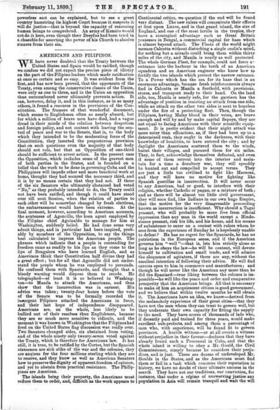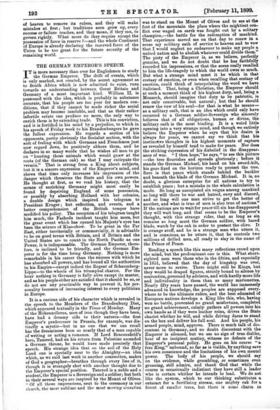AMERICANS AND FILIPINOS.
WE have never doubted that the Treaty between the United States and Spain would be ratified, though we confess we did not expect the precise piece of idiotcy on the part of the Filipino leaders which made ratification at once so certain and so easy. It was evident from the first, and has now been proved, that the opponents of the Treaty, even among the conservative classes of the Union, were only as one to three, and in the Union an opposition thus outnumbered never ultimately prevents action. It can, however, delay it, and in this instance, as in so many others, it found a resource in the provisions of the Con- stitution. The framers of that wonderful document, which seems to Englishmen often so nearly absurd, but for which a million of bravo men have died, had a vague dread in their minds of the relation between despotism and foreign policy, and not content with leaving the con- trol of peace and war to the Senate, that is, to the body which they intended to be the moderating force of the Constitution, they inserted the preposterous provision that on such questions even the majority of that body should not rule, but that an Opposition of one-third should be sufficient to arrest action. In the present case the Opposition, which includes some of the gravest men of both parties in the States, and is founded on a belief that the work to be done in governing Cuba and the Philippines will impede other and more beneficial work at home, thought they had secured the necessary third, and it is by no means certain that they had not. If three of the six Senators who ultimately abstained had voted " No," as they probably intended to do, the Treaty could not have been ratified, and though it could have stood over till next Session, when the relation of parties to each other will be somewhat changed by fresh elections, the embarrassment would have been extreme. At the final moment, however, according to American accounts, the acuteness of Agoncillo, the keen agent employed by the Filipino chief Aguinaldo to manage for him at Washington, suddenly failed. He had done some very adroit things, and in particular had been inspired, prob- ably by members of the 'Opposition, to say the things best calculated to impress the American people. The phrases which indicate that a people is contending for freedom came as readily to his lips as they come to the lips of Bengalees who have learned English, and as Americans think their Constitution half divine they had a great effect ; but for all that Agoncillo did not under- stand the people whom he was employed to persuade. He confused them with Spaniards, and thought that a bloody warning would dispose them to recede. He telegraphed—at least it is so believed in Washing- ton—to Manila to attack the Americans, and thus show that the insurrection was in earnest. His advice was taken ; twenty-four hours before the vote of the Senate was to be formally recorded the insurgent Filipinos attacked the Americans in force, and their last hope of independence disappeared. Americans are, on the whole, less likely to be bullied out of their resolves than Englishmen, because they are so much more sensitive to ridicule, and the moment it was known in Washington that the Filipinos had fired on the United States flag discussion was really over. Two Senators changed sides, six abstained from voting, and of the whole ninety only twenty-seven voted against the Treaty, which is therefore for Americans law. It has still, it is true, to be ratified by the Cortes, but the Spanish statesmen are sick alike of the war and the colonies, they are anxious for the four millions sterling which they are to receive, and they know as well as American Senators how to preserve the dignity of apparent freedom of opinion, and yet to abstain from practical resistance. The Philip- pines are American.
The islands being their property, the Americans must reduce them to order, and, difficult as the work appears to Continental critics, we question if the end will be found very distant. The new rulers will concentrate their efforts at first upon Luzon, and in that grand island, the size of England, and one of the most fertile in the tropics, they have a strategical advantage such as Great Britain possesses in Bengal, a commercial capital for base which is almost beyond attack. The Fleets of the world might menace Calcutta without disturbing a single coolie's mind, for nothing but a miracle could bring them within thirty. miles of the city, and Manila is nearly as well protected. The whole German Fleet, for example, could not force a entrance into the harbour in the teeth of an American squadron and an American engineer who knew how to fortify the two islands which protect the narrow entrance. To a Power which has the sea for its base that is an enormous advantage, because fresh reinforcements always find in Calcutta or Manila a foothold, with provisions, stores, and transport ready to their hand. On the land side, too, Manila is nearly safe, for the garrison has the advantage of position in resisting an attack from one side, while an attack on the other two sides is next to hopeless under the fire of a protecting fleet. Then, though the Filipinos, having Malay blood in their veins, are brave enough and will by and by make capital Sepoys, they are not equal to facing Americans with their scientific equip- ment. It is pretty evident that their night attack was more noisy than efficacious, as, if they had been up to a determined rush, they ought in the darkness, with their knowledge of localities, to have entered the city ; and by daylight the Americans scattered them to the winds, burnt their villages, and pursued them for six miles. They, in fact, acknowledge themselves defeated, and even if some of them retreat into the interior and main- tain for a time a, desultory war, they will speedily be hunted out and compelled to accept terms. They are just a little too civilised to fight like Maroons, and they will have no motive for fighting like Spanish guerillas in insurrection. It will never occur to any American, bad or good, to interfere with their religion, whether Catholic or pagan, or a mixture of both ; and as there will be almost too little civil government, they will soon find, like Indians in our own huge Empire, that the motive for the very disagreeable proceeding known as insurrection is insufficient. Why should a Tagal peasant, who will probably be more free from official oppression than any man in the world except a Hindo- stanee peasant, risk his life, and his house, and his means of subsistence to enter on a contest with rulers whom he sees from the experience of Sunday he is hopelessly unable to defeat? He has no regret for the Spaniards, he has no patriotism in the European sense, and if the American governs him " well "—that is, lets him strictly alone as long as he obeys the law—he will be content, will devote himself to cultivation and small trade, and will admire the eloquence of agitators, if there are any, without the smallest intention of following their advice. He will find careers open to him in commerce and manufactures; and though he will never like the American any more than he did the Spaniard—true liking between the colours is im- possible—he will like the peace and order and comparative prosperity that the American brings. All that is necessary to make of him an acquiescent citizen is good government, and we believe that within twelve months he will obtain it. The Americans have an idea, we know—derived from the melancholy experience of their great cities—that they have not the men whom they can trust to govern well, but they underrate their own capacity for fitting the supply to the need. They have scores of thousands of lads who, if decently paid and trained for three years, would make excellent sub-prefects, and among them a percentag6 of men who, with experience, will be found fit to govern provinces. A hostile witness—or at all events a witness without prejudice in their favour—declares that they have already found such a Proconsul in Cuba, and that the whole island is willing to obey a Mr. Gould, the Civil Commissioner, simply because he considers their preju- dices, and is just. There are dozens of undeveloped Mr. Goulds in the States, and as the Americans must find them or fail in a task which concerns their reputation in history, we have no doubt of their ultimate success in the search. They have not our traditions, our conviction, foi instance, that under a regime of unswerving justice any population in Asia will remain tranquil and wait the will of heaven to remove its rulers, and they will make mistakes at first ; but traditions soon grow up, every success or failure teaches, and they mean, if they can, to govern rightly. What more do they require except the possession of force in reserve ?—and the whole Continent of Europe is already declaring the reserved force of the Union to be too great for the future security of the remaining world.







































 Previous page
Previous page